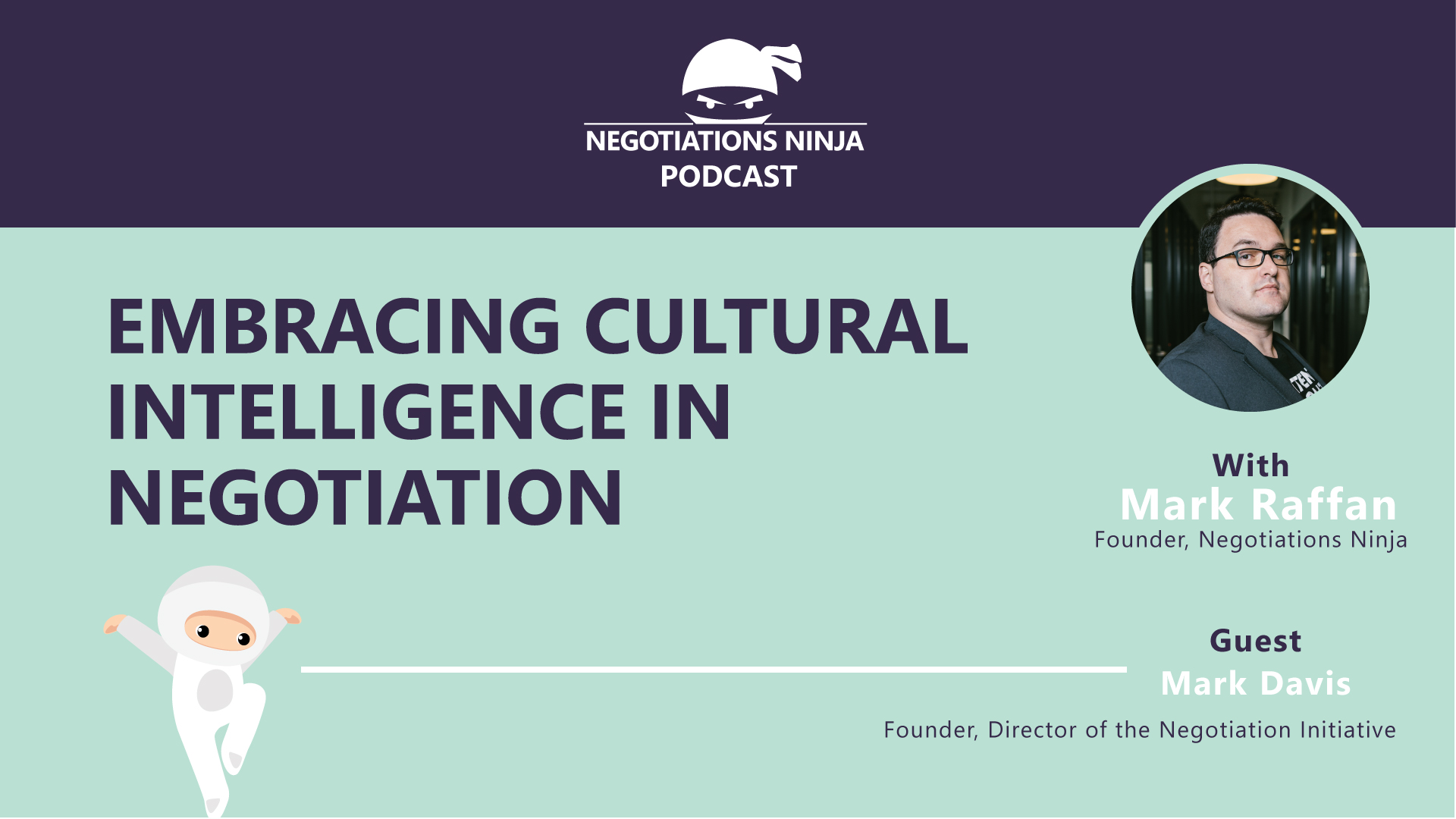Negotiators don’t always take into consideration the importance of understanding cultural intelligence. Culture isn’t just an outlying factor, but it’s pervasive and impacts every moment of a negotiation. In this episode of Negotiations Ninja, Mark Davis joins me to talk about the impact of culture, the lens through which we can understand it, and how it influences your decision-making.
Mark Davis is a negotiator who emphasizes the importance of cultural intelligence. Negotiating with people from different cultures—and organizational cultures—is becoming more and more common. To be effective at what we do, we must learn to adjust and adapt our negotiation techniques to find success for both parties. Listen for his expertise in cultural intelligence.
Outline of This Episode
- [0:45] Culture and how it impacts negotiations
- [2:00] Mark’s background in negotiation
- [3:56] What negotiation is—and what it isn’t
- [6:29] Why it’s important to understand culture
- [8:40] Adaptation of perspective in the midst of conflict
- [14:05] Top 3 cultural negotiation values to master
- [19:20] The concept of a negotiation campaign
- [23:53] Cultural differences aren’t something overcome
- [24:57] Connect with Mark
The simple premise of negotiation isn’t so simple
The basic premise of a negotiation is when two parties come together to get a deal done. Each side makes clear the criteria they have and what they want the product or service to achieve. It seems relatively straightforward and simple in nature. But Mark points out that you often get to a point where you reach a deadlock or conflict both parties cannot overcome.
In Mark’s experience, using the best tools he had available, he still couldn’t find a way to overcome the issues. There wasn’t a language or lens to look at the negotiation differently to get past the issues he was facing in negotiations. What Mark found is that people often didn’t take into account the culture of both organizations.
Why Cultural Intelligence is important
Mark goes on to share that “Culture at its very nature is pervasive in all negotiation and in fact, it should be a framework through which you can overcome these obstacles and they rise to the surface.” Understanding culture gives you that elusive lens through which you can look at a negotiation differently when you reach points of conflict. When you negotiate across cultures that don’t have a ton in common, cultural intelligence is especially important for every interaction you have with the other party.
Mark establishes that cultural intelligence is utterly important—so how do you develop it? It starts with a basic understanding of how culture differs in every detail. The culture you grew up enmeshed dictates how you address your elders/superiors as well and influences your corporate or organizational viewpoints. In some ways, you are a product of the environment you find yourself in.
Why you must learn to adapt your perspective
Mark points out that adaptation of perspective is something that people are aware of, but don’t readily engage in consciously when faced with conflict. The very definition of cultural intelligence is the ability to “Function effectively in all cultural contexts and all cultural scenarios.” You have to be able to adapt your perspective in the midst of conflict consciously, by design.
It’s difficult to do when emotions are high. Mark points out that cultural intelligence takes emotional intelligence a step further: “Without the language and the capacity that cultural intelligence gives you, your reaction to your own emotional responses is confined to your own cultural perspective.”
So how do we adapt our perspective to understand the cultural intricacies of the conflict? Mark shares about the program they’ve developed to give negotiators that extra layer of capability. Keep listening to learn more about it.
The concept of a negotiation campaign
Mark shares his idea of a negotiation “campaign” of sorts, mainly emphasizing that a negotiation isn’t isolated to a two-week bubble. A negotiation is a cyclical process of understanding the other parties’ motivations and gathering data that feeds into your strategy. Executing your negotiation strategy includes contemplating the words and non-verbal signals you’ll use.
It all comes down to communication. Mark emphasizes that negotiation itself should be viewed as a continuous campaign of action, knowledge gathering and knowledge sharing, planning your strategy, planning your moves, and communicating throughout the year. You constantly strategize and re-strategize throughout the process.
To hear our full conversation and some final words of wisdom from Mark, be sure to listen to the entire episode of Negotiations Ninja.
Resources & People Mentioned
Connect with Mark Davis
- Connect with Mark on LinkedIn
- Follow Mark on Instagram
- Mark’s website: The CQ Negotiator
Connect With Mark
- Follow Negotiations Ninja on Twitter: @NegotiationPod
- Connect with Mark on LinkedIn
- Follow Negotiations Ninja on LinkedIn
- Connect on Instagram: @NegotiationPod




